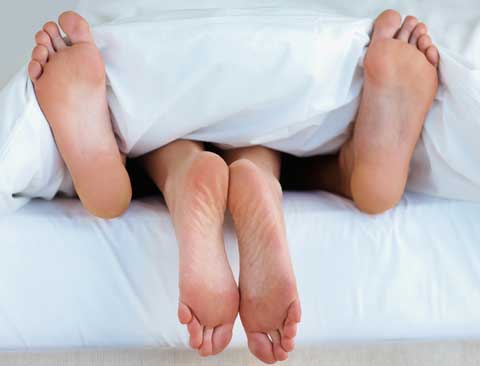'Orgasm' Exercises Alone Fail to Improve Sex

Some couples may not know it, but every time a woman has an orgasm, her pelvic floor muscles contract. And there are exercise programs that can strengthen these internal muscles, which are also used in bladder control and childbirth.
Because studies have shown these exercises can help women with urinary incontinence and simultaneously improve their sexual function, researchers in Brazil guessed they also might improve sex for healthy, older women.
But their small study shows that pelvic floor exercises — which consist of contracting the muscles as if to stop urination, and are often called Kegels, after the physician who championed them — may not influence sexual function as they thought.
A group of 32 postmenopausal women volunteered to undergo a pelvic floor exercise regimen for three months — twice a week in clinician-guided group exercise sessions, and three times a week at home. At the end of the three months, the researchers at São Paulo University measured stronger pelvic muscles in the women, and surveys showed a change in their moods.
Before the workouts, about 44 percent of the women reported having anxiety, compared with 28 percent who said so afterward.
However, the exercise regimen did not improve the women's sexual function, based on their answers to questions about their sexual interest, excitement and satisfaction.
This surprised the researchers. The finding "was contrary to our expectations and is inconsistent with previous reports," they wrote in their article, published Oct. 24 in the Journal of Sexual Medicine.
Sign up for the Live Science daily newsletter now
Get the world’s most fascinating discoveries delivered straight to your inbox.
Other experts weren't surprised that Kegel exercises alone weren't able to improve women's sex lives.
What goes into a sexual response?
"Sexual dysfunction really is multifaceted in women: it's psychological, it's physiological, it includes relationship factors," said Dr. Leah Millheiser, director of the Female Sexual Medicine Program at Stanford University School of Medicine. "A woman may have a perfectly working vagina but have a horrible sex life because of other issues."
Millheiser said more questions about the quality of women's relationships and the stressors in their lives could better pinpoint how well Kegel exercises might improve a woman's sexual function. Yet even then, Millheiser said, researchers would have to account for the hormonal changes in postmenopausal women.
"Lubrication, arousal and sexual response really are dependent on not just mental, but also hormone factors as well," said Millheiser, who added that hormonal changes in menopause can thin the walls of the vagina and affect women's lubrication, arousal and sexual response. "None of these women [in the study] were receiving vaginal or systemic hormone therapy," she said.
The study also lacked a control group, such as women who were surveyed but did not do Kegel exercises.
Susan Kellogg-Spadt, professor of obstetrics and gynecology at Drexel University College of Medicine, said she didn't expect the exercises would necessarily improve the women's sexual function, since they did not have obvious pelvic floor weakness – they were in relationships and were continent.
"I can't explain the decrease in anxiety, except that when women do any kind of exercise they feel better," Kellogg-Spadt said.
Who needs Kegel exercises?
That's not to say Kegel exercises couldn't help women, sexually or otherwise. Millheiser recommended Kegel exercises for women with vaginal laxity, or, as her patients describe it, that feeling of being "loose" after childbirth.
Kellogg-Spadt said she would recommend them for women with continence problems or who are having trouble with sensation during sexual activity.
"They clearly have the ability to enhance sexual satisfaction, but to say that Kegel exercises are the solution to every sexual problem is a mistake," Kellogg-Spadt said. In fact, she said, Kegel exercises may make problems worse for women who have sexual pain.
This story was provided by MyHealthNewsDaily, a sister site to LiveScience.











